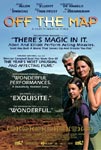Movies |
Off the Map
directed by Campbell Scott
By
Published: Jan 01, 2005
Category:
Drama
Starring the great Joan Allen, with Sam Elliott. An independent film, set in New Mexico in l974. Directed by Campbell Scott, an actor we adore — if you haven’t seen "The Secret Lives of Dentists," it should go on your must-rent list pronto. Lots of awards from film festivals. Enthusiastic reviews. So we go.
There’s a famous story about Marcel Proust. He showed up one night at the dining room of the Hotel Ritz in Paris, whereupon a huge fuss was made over him. A Prussian general noticed. "Who’s that?" he asked. His aide said, "Marcel Proust — he’s a novelist, sir." The general asked, "What’s his book like?" His aide replied, "It’s not ‘like’ anything, sir."
"Off the Map" is also not "like" anything. It has a rhythm all its own — the rhythm of life, deep and slow — and a story that moves, like life, in fits and starts. The plot is more of a situation: Joan Allen and Sam Elliott live with their young daughter in a house that pretty much defines "dropout." No electricity. No running water. And no money — they live on his disability check and barter. They’re not just off the map, they’re under the radar.
It’s a beautiful life. Nude gardening. Shooting bottles at the dump. Watching the stars. Reading "Two Years Before the Mast" aloud at night in the glow of a kerosene lamp.
But there’s a problem. Sam Elliott — grizzled, manly, strong Sam Elliott — is in the throes of a depression so deep he can barely speak. All he can do is cry. And for a great deal of the movie, that’s all he does. He sits in a chair and cries what look for all the world like real tears. I believe this is called "acting" — great acting.
And Joan Allen! What a woman. At every moment, she has Sam’s back — when an IRS agent arrives and falls immediately in love with her, she’s not even momentarily tempted. Her sole concern is for her husband.
Then there’s Sam’s best friend, a seemingly dull guy who’s so loyal he starts going to a psychiatrist in order to get a prescription for anti-depressants.
And, finally, there’s the kid. She narrates the film. She’s smart and verbal and achingly aware of every change in her family’s emotional weather, and you lean in because you don’t want to miss a word, a joke, a perception.
So there they are. Stuck. And you are so stuck with them that, after a while, it’s as if you were living in New Mexico, isolated from everyone but these few people. And you see, as you did not before, that they’re not freaks, not objects of your derision. They’re solid people. They have good values. Maybe better than yours.
And they’re not losers. Things work out. Not in ways you’d expect, but in ways that make perfect sense. You feel, with them, a lightness. It’s hard-earned, and that makes it more satisfying.
The last shot of the movie is like a catch in the throat. It’s nothing. But there you are, in tears. Weeping for joy.
This is, as I say, an independent movie. Not playing in 2,000 theaters and taking in $20 million the first weekend. For the sake of your soul, don’t miss it.


